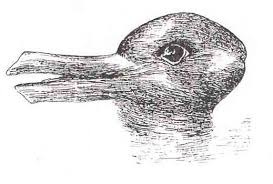Using My 2-Year-Old's Mind to Understand My 30-Year-Old One Better
More, More, More observations
Hello to the flurry of new followers. They say posting consistently is crucial to growth and gaining an audience. The bad news is that I am bad at doing that. The good news is friendly Internet friends like
at Rational Psychiatry give shout-outs.Since I assume most of the new follers are psychiatry adjacent, you might find past writings like Are Doctor’s Clarovoyant?, Underappreciated Concepts in Psychopharmacology, and this book review of interest. Outside of psychiatry, I often just write about things I find interesting - like the things I notice watching my kids grow up. I’ll just link to my About page instead of reinventing the wheel. Thanks to Thomas’s shoutout for giving me the activation energy needed to start turning the backlog of partially written posts into something shareable.
I showed my 2-year-old daughter the duck-rabbit illusion below, without using the word ‘duck’ or ‘rabbit’ and simply asking, ‘What is this’? I would refresh the browser tab, and the same image would reload. She replied Duck. Duck. Duck. Duck. But on the fifth occurrence, out of the blue, she says Rabbit! How often do we get to see an illusion in a naive mind? Of course, responses are influenced by how many ducks vs rabbits she has seen in her life until now, but the fact that the flip happened spontaneously was exhilarating!

While getting breakfast ready, she asked for help cutting her strawberries. I replied, “One minute, I don't have any hands right now”, implying my hands were full. In pure confusion, she pointed out that I had two hands and could, in fact, cut her strawberries. I thanked her for this insight, stopped what I was doing, and joyfully cut her strawberries. It makes me reflect on how drenched in implicit meaning and assumptions our everyday language is. Almost nothing is literal. In another instance, I said, “We can't eat the cookies right now because we want to have something for dessert”. She replied, but we can make more cookies for dessert too. In effect, we could have our cookies and eat them too! It must be confusing being a toddler. No one has informed her that “We can't eat the cookies right now because we want to have something for dessert” actually means ‘that item is unsustainable to eat all the time from a health perspective and society has decided it to be standard to refrain from its consumption until the primary meal is complete’. It’s not her fault she hasn’t integrated the unspoken cultural meaning behind things.
One night, after tucking her into bed, she unpromptedly declared, “I happy, Dad”. And she looked it. I’d never heard her say the word ‘happy’ before, but she picked it up somewhere. Was she content? Satisfied? <insert the hot new term for positive valence>? Whatever the label, she had it.
Easter passed by, but Easter egg hunts continue long after April when you have children. It took a while for her to grasp the idea of closing your eyes to count down - she had just as much fun collecting them while watching me hide them. Eventually, we swapped roles, and I was the finder, and her the egg hider. But when my countdown hit 0, and I turned to find the eggs, they were in a pile right in front of me; she stood there in anticipation, and she laughed. I laughed. I wonder why she found this funny. To me, it is how it turned the concept of hiding Easter eggs upside down. The absurdity of going through the ritual of closing eyes, counting, etc., to get the opportunity to look for something that is intentionally in front of you. I think it's something else for her. Something less conceptual/intellectual and more based on raw affect. I vibe with it.
She randomly made her bed one morning. They model so much behavior. They are sponges of your good and your bad. When I see children in the ED with psychiatric problems, and parents demand I tell them what is wrong with the child and that I fix them, I can’t help but feel the weight of years of relationship modeling, integrated interpersonal dynamics, and social learning driving the patient to this very encounter. Parents don’t like being told that the lack of Prozac isn’t the problem.
While flipping through a book about rainbow colors, we came across teal. She called half the items on that page ‘green’, and half the items ‘blue’. Our language limits our interpretation of experience. How does this play out when describing our inner mental life? Part of ‘feeling better’ is simply realizing there is space between ‘good’ and ‘bad’. Better yet, there are dimensionalities beyond the good-bad spectrum.
She has began to develop what I call ‘pure affective responses’. - traditionally called temper tantrums. Just absolute wailing to natural, predictable consequences of things. There’s no logic or cognition - you can just see the flood of affect. Helping in these times has little to do with the content of language or rationalizing, but hugging, holding close, and speaking to her ‘affectively’ Is it evident I was reading about Panksepp’s evolutionary taxonomy of emotions and affects over the last few months? These responses are clear in children, but I suspect it is the same in adults; just more hidden. Adults have more robust ego defense mechanisms.
She knew the ABCs at 24 months. She would walk around singing them to herself. She had it so down pat that at 26 months, I began singing the ABCs in Spanish to her. She interpreted this as ‘I can just make any garbled sound I want as long as it is to the tune of ABCs’ and then walked around sounding foolish for a few months until she returned to the normal English ABCs. Teaching backfires.
I had a second child. I thought that I loved the first one so much that there wasn’t room for another. It turns out the volume of available love just expands. Is this boundless?
Public reminder: words quickly become independent concepts in our minds that are devoid of the actual raw information. My daughter found the word headbutt hilarious, while I had glossed over the fact that the word head and the word butt are both there and juxtaposed next to each other. Now that I think about it, why is the word headbutt and not something like headhead?
At home, my daughter sings, uses humor intentionally, has inside jokes with me, and boggles my mind with her development. In public, she is silent and reserved and doesn’t do any of her ‘tricks’1 for people. It’s taught me to remember how vast of a disconnect there can be between the cognitive capacity/intellect and its outward expression. Cognitive capacites can only be measured as well as they can be communicated.
High fives, quirky inside jokes, etc.


My 6 month old is coming along quick, I’ll have to pay attention to some of her quirks thanks for the write up.